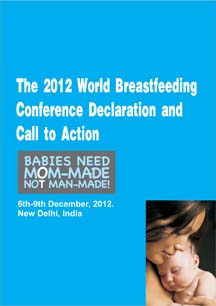World Breastfeeding Conference Declaration (extract)
 We, the participants from 82 countries coming from diverse groups including governments, breastfeeding organisations, health providers, people’s organisations and movements, international NGOs and individuals... recognize that protection, promotion and support of breastfeeding and optimal infant and young child feeding is a human rights issue and should be entrenched in the public policy and programmes as a necessary condition needing resources.
We, the participants from 82 countries coming from diverse groups including governments, breastfeeding organisations, health providers, people’s organisations and movements, international NGOs and individuals... recognize that protection, promotion and support of breastfeeding and optimal infant and young child feeding is a human rights issue and should be entrenched in the public policy and programmes as a necessary condition needing resources.
We call upon all concerned to take the following actions:
- Adopt a human right-based approach to the protection, promotion and support of breastfeeding and infant and young child feeding at international, national, sub-national and community levels.
- Establish institutional mechanisms to avoid and manage conflicts of interest in health and nutrition decision-making and programme implementation.
- Support all women with a comprehensive system of maternity protection at work, including the non-formal sector, with a provision of financing.
- Ensure appropriate and adequate education and training of all health care professionals and allied health and community workers both in pre-service and in-service, and in all sectors, to counter widespread ignorance.
- Establish clear budget lines for breastfeeding and infant and young child feeding policy and programme interventions to ensure adequate human and financial resources in order to enhance optimal practices.
- Invest in the Baby Friendly Hospital Initiative including mother friendly practices and link it to community initiatives. Further this should be rooted in all maternal and neonatal health programmes, and with due attention to low birth weight babies.
- Publicise widely the multiple risks of artificial feeding, bottles and teats as well as early complementary feeding through all kinds of media campaigns.
- Ensure universal access to accurate information and counselling on breastfeeding and infant and young child feeding to all mothers, and to do that provide skilled counsellors in the health facilities and in the community so that they are available for any situation.
- Monitor and track the Global Strategy for Infant and Young Child Feeding in every country using World Breastfeeding Trends Initiative (WBTi) and advocate to bridge the gaps.
- Protect breastfeeding from commercial sector, by strictly enforcing the International Code of Marketing of Breastmilk Substitutes and subsequent related World Health Assembly Resolutions and prohibit all kinds of promotion of commercial foods for children for two years or beyond.
- Promote the use of affordable and diverse, locally grown, indigenous foods for timely and appropriate complementary feeding after six- months along with continued breastfeeding.
- Enhance and support breastfeeding related research with public funding.
Full declaration available at:
http://www.worldbreastfeedingconference.org






